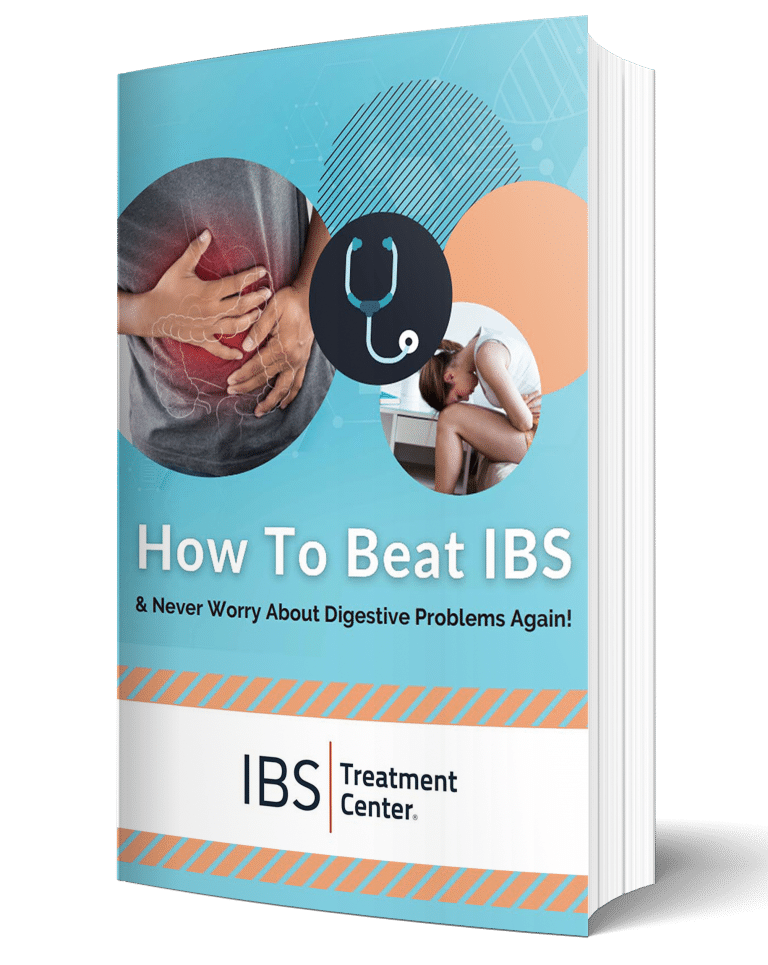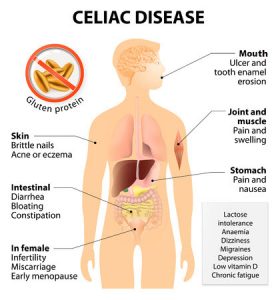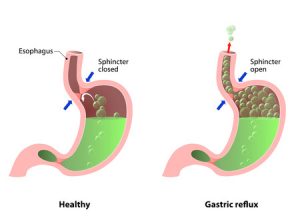IBS, which stands for irritable bowel syndrome, is a big label given to a group people who have one or more very common digestive symptoms (as described in the journal Clinical Gastroenterology). There are many different symptoms that are covered under the IBS umbrella, but four major symptoms really stand out.
These are:
If you have one or more of these symptoms for a few months or longer, then you probably have IBS.
Keep in mind that you may experience only one of these symptoms, or any combination of these symptoms. And it’s not unusual for symptoms to change over time, which can be in the same day or over the course of several years. With this in mind, it’s not surprising that IBS presents differently in different patients. (American Journal of Gastroenterology.)
IBS can also involve many other symptoms. These are described after we address the four primary symptoms.
Finally, the symptoms of IBS are also found in several other diseases. Those other diseases are what other doctors, including your gastroenterologist, are primarily looking for when you go to the doctor. They are not focused on looking for IBS, but on ruling out other problems, which is important. (Clinical Gastroenterology and Hepatology)
But when they don’t find any of them (i.e. appendicitis, gallstones, pancreatitis, C. difficile, cancer, etc.) then they end up unable to help you, and you end up with no answers. This is why you need an IBS specialist, a doctor who is an expert in IBS. All we do at the IBS Treatment Center is diagnose and solve digestive problems that have fallen through the cracks.
The Four Primary Symptoms of IBS
Diarrhea: IBS-D
Diarrhea, which may be called IBS-D, is often thought to be the classic component of IBS, but less than half of people with IBS have diarrhea. Although it can be urgent and explosive, diarrhea comes in many other forms. Stools can be regular but very loose and watery, mushy, or soft and crumbly and fall apart. Surprisingly, some IBS patients alternate between diarrhea and constipation, sometimes referred to as mixed IBS, or IBS-M. Whether or not you think of your diarrhea as problematic, it’s a serious sign that you aren’t digesting properly and therefore not absorbing nutrients properly. This affects the health of your entire body. There is always a solution for diarrhea, and we’re here to help you find it! Contact us online. Read some of our patient success stories here.
Constipation: IBS-C
Optimally, you should have at least one unremarkable bowel movement (BM) each day. That’s normal. But if your BMs are less frequent than once a day then you have constipation, which may be called IBS-C. You also have constipation if your BMs are very dry and hard, or made of small pellets, or difficult to pass, or incomplete (meaning it takes several tries before you feel done), even if you have a bm every day. And if you must take extra dietary fiber or consistently use some other product to avoid any of these outcomes, you have constipation. The IBS Treatment Center takes solving constipation seriously because it’s so important to your overall health! Get in touch with us for help with your constipation.
Abdominal pain or discomfort
Many, but certainly not all IBS patients experience abdominal pain or abdominal discomfort (stomach aches), and some experience only abdominal pain, without diarrhea, constipation, gas or bloating.
Abdominal pain or discomfort in IBS can range from completely debilitating stabbing pains, to cramping, to relatively minor tummy aches. Sometimes the pain is so bad that people end up in the emergency room. Unfortunately, that rarely helps solve the problem. The ER is a great place to go for other problems, but not IBS. Sadly, most IBS sufferers with severe pain leave the ER with nothing more than pain meds (Investigative Radiology). We’ve helped many patients who’ve been down this road. Call us now at 888.546.6283 to help solve this problem!
Bloating & Gas
Bloating is a common symptom in IBS patients (see American Journal of Gastroenterology), though not all IBS patients have bloating. Bloating is usually fairly obvious to the sufferer, and it can range from mild to looking like you’re pregnant or feeling like you have a basketball under your shirt. It can fluctuate throughout the day, and often your clothes won’t fit well. Bloating may or may not be accompanied with gas or abdominal discomfort. Regardless, it’s a sign that you aren’t digesting well, and we can help you.
Excessive or particularly odorous gas is not normal. Gas can be the sole symptom of someone suffering with IBS, and it may or may not be accompanied with bloating. Gas is possibly the most embarrassing IBS symptom because it so difficult to disguise. Having problems with gas or flatulence is a clear sign that you have IBS and that you aren’t digestive your food well.
Treating these four symptoms is part of the core of our success at the IBS Treatment Center. Don’t let these symptoms alter your life another day. We have helped 1000’s of patients solve their IBS. You can read some of their stories here.
Other Conditions Associated with IBS
IBS sufferers frequently have other symptoms or get diagnosed with other fancy terms. Listed below are many of the digestive symptoms frequently associated with IBS that we routinely treat in our IBS patients. We find that these symptoms are usually solved when our IBS patients get better. If you have any of these conditions, call us to schedule an appointment. We can help!
Abdominal migraines
Abdominal migraines is a diagnosis sometimes given to people, especially children, who suffer from severe stomach pain, nausea, abdominal cramping, and vomiting. (As discussed by Dr. Russell in the paper Abdominal Migraine) It’s a fancy way of saying that your stomach isn’t happy. In our experience, it’s another form of IBS and is just as treatable as IBS.
Anal itching or burning
Anal itching and/or burning are sometimes found in people who have IBS, and the causes are often intertwined. Fortunately, the alleviation is usually intertwined as well!
Anemia
If you have chronic problems with anemia, then you may not be absorbing your nutrients well. Anemia is often associated with diarrhea, as shown in American Family Physician, and if you are having trouble solving it, then you may have IBS.
Belching and Burping
Belching and burping are the results of excess gas production and another sign that you aren’t digesting your food well. This often goes hand in hand with IBS (as discussed in this research paper on IBS) and is usually readily solvable.
Canker sores
The mouth is the beginning of the digestive tract, and we’ve noticed that patients who suffer from canker sores are often healed when their IBS is resolved. (See article by Dr. Krebs.)
Celiac disease
When celiac disease patients don’t get better by avoiding gluten, then they are likely suffering from IBS, as discussed in the journal Clinical Gastroenterology. We can help with this.
Colic
Colic is the word used when babies suffer from gas, which is another way of saying IBS. Just because we don’t call it IBS in babies doesn’t make it different. Babies shouldn’t suffer from colic (gas) any more than adults should. We love treating babies, and find that they get better just like adults do!
Colitis
Colitis is a generic word for inflammation in the colon and was an older term for IBS. If you have colitis, then you probably have IBS.
Collagenous colitis
Collagenous colitis is a fancy word for a type of inflammation in the colon. It’s really another way of saying that you probably have IBS. You can usually solve them at the same time.
Crohn’s Disease 
Crohn’s disease and IBS aren’t as different as people often imagine. Many people suffer from both Crohn’s and IBS at the same time, and there is a tremendous amount of overlap (as discussed in Expert Review of Gastroenterology) between the causes for each of these problems. We’ve helped many patients with Crohn’s and are experts in using tools that other doctors consider new and emerging for this field. If you want the latest Crohn’s disease treatment, call us immediately!
Cyclic vomiting
If you’re vomiting, then your body is rejecting what you’re eating. Many of our patients have experienced the resolution of this problem, which shouldn’t be too surprising. It’s just IBS coming out the top end instead of the bottom end. The American Journal of Gastroenterology shows a high correlation between IBS and nausea/vomitting.
Dyspepsia
Dyspepsia is a fancy term for an upset stomach. This is commonly seen in IBS patients (See research by Dr. Ford in Clinical Gastroenterology) and typically resolves with their IBS. Our former dyspepsia patients are relieved to be rid of it!
Encopresis
Encopresis is a term used in children who have constipation. In our experience most children with encopresis are essentially suffering from IBS and there is a tremendous amount of overlap in their test results (see Dr. Pimentel in Digestive Diseases and Sciences). They improve just like our IBS patients. Unfortunately, the child is blamed for the problem when it isn’t their fault. If your child suffers from encopresis, call us today and get a second opinion!
Eosinophilic Esophagitis (EE)
Eosinophilic esophagitis is a specific type of inflammation in the esophagus. Eosinophils show up when there is an allergic reaction to something. Sometimes our IBS patients have this and it almost always is solved, even if they don’t have any other signs of IBS.
Functional disorders
Functional digestive disorders are a broad category that literally means that your digestive tract is not functioning well. You probably already know that. It’s another way of saying that you have IBS. The implication is that you have a digestive problem because your body isn’t functioning well. But wait, that’s not helpful. We’re just going around in circles…. Call us today and we’ll get you off this hamster wheel!
Gastritis
Gastritis is a broad term for inflammation of the stomach. What you want to know is why you have that inflammation. We can help you to figure that out! Many IBS patients suffer from gastritis (see study by Dr. Helvaci) and find that their gastritis improves right along with their IBS.
Gastroparesis
Gastroparesis is a fancy word that means that food is not leaving your stomach in a timely manner. This is another way of saying that your digestive tract is irritated. But why? Many of our IBS patients had suffered from gastroparesis (discussed by Dr. Evans in Digestive Diseases and Sciences) that completely resolved along with the IBS. Call to schedule an appointment, we’ll help you figure out the why.
GERD, Heartburn, and Reflux 
Gastroesophageal reflux disease (GERD) causes acid reflux (commonly called heartburn). GERD and IBS often go hand in hand (Dr. Nataskin in Digestive Diseases and Sciences) and are frequently solved together. It’s another way of saying that your digestive tract is irritated. We’re experts in helping people solve an irritated digestive tract. Call today!
Indigestion
Indigestion is a general term for digestive problems. In our experience, most people with indigestion have IBS (as noted by Dr. Kingham in the Journal of the Royal Society of Medicine).
Inflammation
IBS patients often report that some type of inflammation was seen during an endoscopy or colonoscopy. (This is shown in a paper by Dr. Ohman.) It generally resolves along with their IBS.
Inflammatory Bowel Disease (IBD)
IBD includes Crohn’s Disease and Ulcerative Colitis. See those terms for more information.
Leaky gut
Leaky gut is a fancy way of saying that there is inflammation in the digestion tract and thus leakiness of the intestinal lining (article by Dr. Gesci in the journal Digestion). This is really just a symptom of IBS. We can help you sort out why it’s happening and get to the root of the problem.
Lymphocytic colitis
Lymphocytic colitis is a type of inflammation of the colon. In simple terms, it means that your immune system is upset about something. If you have lymphocytic colitis, then you probably have IBS, as shown in the journal Gastroenterology. You can usually solve them together.
Malabsorption
Having IBS generally implies that you are not digesting your food well, which usually means that you aren’t absorbing your nutrients well. This is malabsorption. Solving IBS solves the malabsorption problem.
Microscopic colitis
Microscopic colitis is a broad term for several types of inflammation in the colon, including lymphocytic colitis. In our experience most people with this diagnosis have IBS, and the journal Gastroenterology agrees.
Motility disorders
Motility disorders are fancy ways of saying that food is moving either too slowly or too quickly through your digestive tract, i.e. constipation and diarrhea. It’s another way of saying that you have IBS (article by Dr. Lind).
Nausea
Nausea is a sign that your stomach is irritated by your food. Many IBS sufferers complain of nausea (the American Journal of Gastroenterology shows a high correlation between IBS and nausea) and we find that both nausea and IBS improve at the same time.
Ulcerative Colitis
Ulcerative Colitis is not as different from IBS as many people believe. There is a tremendous amount of overlap in these two conditions (as discuss in Expert Review of Gastroenterology), and many people suffer from both at the same time. Solving IBS has often dramatically improved Ulcerative Colitis in our patients. We’ll work with you and your other doctors to increase your ability to heal your digestive tract for the long term. Don’t let this debilitating condition slow you down. Call us today for an appointment!
Vomiting
If you’re vomiting, then your body is rejecting what you’re eating. Sorting this out is often similar to solving IBS.
Contact the IBS Treatment Center
Most IBS sufferers start with their primary care physician but most PCPs and even gastroenterologists do not have the expertise to help you solve IBS. At the IBS Treatment Center, our practice is devoted solely to IBS.
We have treated thousands of patients from across the U.S. who are now living IBS symptom-free and no longer struggling with IBS.
Contact the IBS Treatment Center now to schedule an appointment at our Seattle, WA or Santa Monica, CA locations. Or call 888.546.6283 and we will get you all set up. Call now to get your life back! Let us show you how living free of symptoms can change your life. We have helped 1000’s of patients and you can read some of their stories here.







